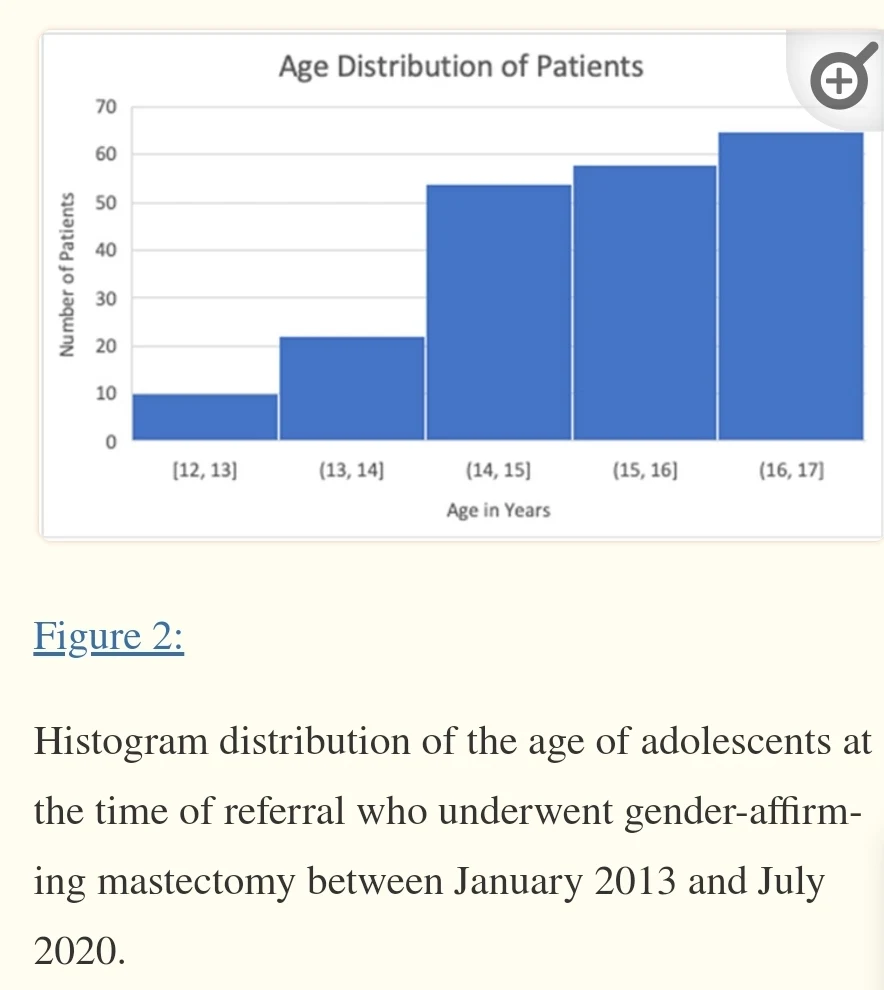I ripped the chunks of the paper that I figured would be of most interest, but you can check out the full study here https://www.ncbi.nlm.nih.gov/pmc/articles/PMC9555285/ 
Tl;dr: Documented regret rate for FTM top surgery on minors is under 1%
Gender-affirming mastectomies performed from January 1, 2013 - July 31, 2020 in adolescents 12-17 years of age at the time of referral were identified...
Summary:
...Of the 209 patients who underwent surgery, the median age at referral was 16 years (range 12-17) and the most common technique was double-incision (85%). For patients with greater than 1-year follow-up (n=137, 65.6%), at least one complication was found in 7.3% (n=10), which included hematoma (3.6%), infection (2.9%), hypertrophic scars requiring steroid injection (2.9%), seroma (0.7%), and suture granuloma (0.7%); 10.9 % underwent revision (n=15). There were no statistically significant differences in patient demographics and clinical characteristics between those with and without complications (p>0.05). Two patients (0.95%) had documented postoperative regret but neither underwent reversal surgery at follow-up of 3 and 7 years postoperatively.
Methodology
....For the entire cohort of 209 patients, manual chart review was performed to search for satisfaction versus regret/dissatisfaction within both postoperative surgical and mental health provider records....After review of notes, an additional search function of key words within the chart was completed to identify notes that may express patient regret not captured with initial review of notes. The key words used were “regret” and multiple synonyms captured by the EHR including “dissatisfaction,” “dissatisfied,” “unsatisfied,” “unhappy”; versus “satisfaction,” “satisfied,” and “happy.” Outcomes were then categorized as satisfaction, regret, or not documented.
It's nice that they looked through mental health provider records. I think a regret case is highly likely to mention dissatisfaction offhand to a therapist, as listening to people complain about their lives is much of what therapists do. 
Demographic data:
...Had a median post-operative follow-up length of 2.1 years (IQR 1.69). Most patients were Caucasian (68%) followed by Latinx/Latinx (15%), Asian/Pacific Islander (5%), Black (3%), and other (8%). Twelve percent (n=23) had MediCal insurance. The majority of patients identified as male (87%) and the remaining were nonbinary (10%) or other/questioning (3%)...
Yes chud, 12 year olds can get their teats yeeted in Cali 
Let's take a deeper dive into the reports of regret:
After a median follow-up of 2.1 years, no adolescents underwent a reversal operation within our system, but two adolescents (0.95%) expressed regret. One adolescent identified as nonbinary, and underwent surgery at age 16. Seven months postoperatively, the patient questioned the timing of their surgery, and expressed regret at 1.5 years throughout a follow-up period of 3.7 years. Postoperatively, the patient was in an un-affirming and unsupportive home and social environment. The second adolescent identified as nonbinary, and underwent surgery at age 16. The patient mentioned regret 11 months after surgery and expressed interest for reversal with the mental health provider but ultimately did not pursue reversal surgery (i.e., breast reconstruction) throughout a follow-up period of 6.5 years within our system. Both patients had normal BMI, well-managed psychiatric anxiety and depression, underwent the double-incision technique, and neither had a complication or desire for revision.
I found it interesting that both regret cases occurred within 1 year, as usually the chud cope to these kinds of studies are to assert that in 2 more weeks a huge wave of regret will come. Yet it appears that in this case those who had second thoughts had them in a relatively short timeframe despite some patients having had many years to voice regret.
The authors summarize other existing literature:
gender surgeons report that “regret after gender-affirming surgery is considered a rare outcome.”52 Danker et al. utilized an anonymous survey to plastic surgeons to study how frequently they were confronted with patients seeking reversal surgery. Of an estimated number of 22,725 patients, they reported 62 patients who expressed regret or sought de-transition care, with the most common reason being a change in gender identity. In a survey of 68 patients aged 13-25 years who underwent gender-affirming mastectomy with a median follow-up of 2 years, Olson-Kennedy et al. reported a regret rate of 1.5% (n=1) in which one patient answered “sometimes” to the survey statement, “It was a good decision to undergo chest reconstruction.”34 Dhejne et al. examined the incidence and prevalence of all requests for adult surgical s*x reassignment in Sweden from 1960-2010.53 They defined a regret rate as the number of s*x reassigned individuals that later applied for reversal to the original s*x. In 681 patients, they found five female-to-male individuals corresponding to an overall regret rate of 2%.53 Van de Grift et al. assessed satisfaction after any gender-affirming surgery with standardized questionnaires in 201 adult patients. They found that postoperative satisfaction was high, ranging from 94-100%, and that only 6% reported dissatisfaction or regret after 5 years from the first gender clinic contact.54 In our cohort, two patients (0.95%) expressed regret; one inquired about reversal surgery, but neither had undergone reversal surgery within follow-up periods of 3.7 years and 6.5 years. Amongst adult transgender patients, common reasons identified for regret were reported as a change in gender identity, rejection or alienation from support system, or difficulty in romantic relationships.










.webp?h=11)

Jump in the discussion.
No email address required.
Bussysingal will bussyblast this faster than it takes doctor teetyeet to amputate a physically healthy minor.
Jump in the discussion.
No email address required.
It's an old enough study if he blasted it he probably did it already
Jump in the discussion.
No email address required.
Probably, filing this one in "already bussyblasted".
Jump in the discussion.
No email address required.
Someone please link the BARpod episode on this study so I can form an opinion
Jump in the discussion.
No email address required.
More options
Context
More options
Context
More options
Context
More options
Context